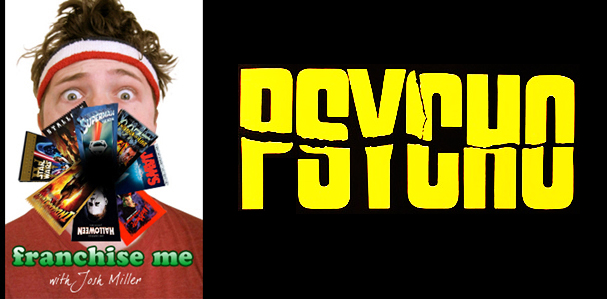
Hollywood loves a good franchise. The movie-going public does too. Horror, action, comedy, sci-fi, western, no genre is safe. And any film, no matter how seemingly stand-alone, conclusive, or inappropriate to sequel, could generate an expansive franchise. They are legion. We are surrounded. But a champion has risen from the rabble to defend us. Me. I have donned my sweats and taken up cinema’s gauntlet. Don’t try this at home. I am a professional.
Let’s be buddies on the Facebookz!
The Franchise: Psycho — following the deadly legacy of the Bates Motel and its primary caretaker, Norman Bates (Anthony Perkins). The series launched with Alfred Hitchcock’s 1960 landmark adaptation of author Robert Bloch’s novel of the same name, and spawned over the next 38 years three sequels, a failed TV series that was converted into a failed TV movie, and the most infamous remake in recent cinema history. We shall be checking in over night on all six Psycho installments.
previous installments
Psycho
Psycho II
Psycho III
Bates Motel
Psycho IV: The Beginning
The Installment: Psycho (1998)
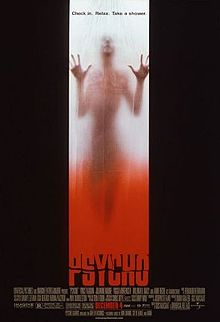
The Story:
In honor of Gus Van Sant’s decision to do a shot-for-shot remake of Alfred Hitchcock’s Psycho, but now with jerking-off added, I have decided to do a word-for-word remake of my summary of Alfred Hitchcock’s Psycho from the first installment of this Franchise Me series, but now with jerking-off added.
Marion Crane (Anne Heche) is in a wee bit of a pickle. She lives in Pheonix, but she’s in love with a divorced man, Sam Loomis (Viggo Mortensen), who runs a hardware store in the fictional town of Fairvale, California. They must meet in hotels and motels, their love kept out of public. In a poorly thought out bid to be with her man, Marion steals $400,000 from one of her boss’s clients and makes a break for Fairvale. After stupidly attracting the attention of a highway patrolman and getting lost in a rainstorm, Marion decides to stop off for the evening at a secluded motel run by a charmingly awkward nerd, Norman Bates (Vince Vaughn), who lives alone with his ailing mother and emotionlessly masturbates while spying on customers. Um, spoiler alert? Marion all sorsta gets killed by Norman’s deranged mother and Norman is forced to cover up the crime when a persistent private detective named Milton Arbogast (William H. Macy) comes looking for Marion. Ditto for when Marion’s sister Lila (Julianne Moore) and Sam come looking too. Then a huge twist punches us in the face! Spoiler alert: Norman Bates was Keyser Soze all along! And Keyser Soze was dead the whole time and didn’t even know it! Plus Darth Vader is Luke Skywalker’s dad, soylent green is made out of people, and Sean Bean dies.
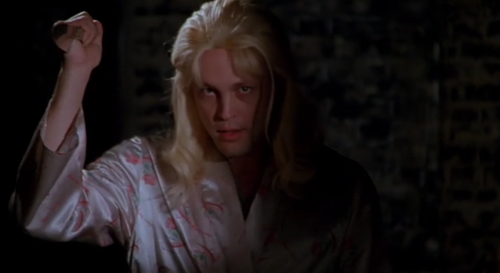
What Works:
No one likes getting older, but one of the few pleasurable aspects of surviving through the passage of time is seeing how much context colors anything and everything. In 1998 fans and cinefiles alike foamed at the mouth over what they felt was Gus Van Sant’s borderline malevolent logic in creating a remake which slavishly changed nothing from the original film. Then, just a handful of years later, fans and cinefiles alike raged about remakes in which filmmakers arbitrarily changed everything, showing zero regard for what made the original film good/popular in the first place. The best thing that ever happened to Van Sant’s Psycho was Platinum Dunes and the rest of the 00’s remake bender. Not so much because the criticisms lobbed at P98 (as I shall now call it) now seem incorrect or overly harsh, but just that Van Sant’s bonkers goal at least seems interesting by comparison to what followed. No one talks about the Amityville Horror remake for a reason. There is nothing to say. People may not be saying good things about P98, but the film has taken on a perverse relevancy over the years purely because people never stopped talking about it. It has become a cinema benchmark. Van Sant left an impression, which at its core is what any piece of art/entertainment wants to do. P98 is a waste of time. But it is such a waste of time that it is kind of fascinating — by doing a Marx Bros mirror routine with Hitchcock, Van Sant is really inviting us to further analyze Hitchcock’s film, not his own film.
It is hard to believe that Gus Van Sant wasn’t aware of the disdain and non-comprehension the world would lob at him and the film, and he clearly didn’t care — this is what he wanted to do, and he was likely giddy over the fact that Good Will Hunting had offered him the opportunity to do cinema karaoke and actually make audiences watch. P98 is more an exercise or experiment than it is a film. Van Sant clearly did it to try and understand Hitchcock, for the same reasons that Thor Heyerdahl sailed 5,000 miles across the Pacific Ocean in a shitty raft. You gotta walk a mile in a man’s shoes to truly know him, as they say. Sure, it is kind of weird to sit and watch someone do that on the big screen, but hey, it is better than the Nightmare on Elm St remake. Re-watching P98 in 2012, after masochistically sitting through nearly a decade of creatively-bankrupt horror remakes, in a strange way I kind of appreciated Van Sant’s absurd undertaking on an artistic level (be it a high-concept personal one). The line between infamy and fame has always been blurry, and one has to wonder, if in the end, P98 will be what Van Sant is most remembered for — as far as discussion of him is concerned. Say what you will about the film, but Van Sant wound up ironically creating something wholly unique in film history; something that may not be replicated in our lifetime, largely because of the response to P98.
P98 is a good movie. I mean, how could it be bad? It’s exactly the motherfucking same as Psycho, which is a great movie. There are many deficiencies, which we’ll get to in a second, but objectively it is a well-written, well-paced film stocked with excellent actors. Sticking with Joseph Stefano’s original script is a respectful idea, that, had Van Sant not used Hitchcock’s film as storyboards, would have given P98 the feeling of a Broadway revival of a popular play. P98 even improves upon the original in one way: I would say it has an overall better cast. Philip Baker Hall, Rance Howard, James Remar and William H. Macy are ideal replacements for their 1960 counterparts; Anne Heche makes Marion Crane a more plausible and complex character than Janet Leigh was capable of; Viggo Mortensen and Juliane Moore are significantly more nuanced performers than John Gavin and Vera Miles; TV-veteran Chad Everett is nothing short of a small revelation as the Naugahyde-tanned millionaire Tom Cassidy, who inspires Marion’s pivotal robbery; and Robert Forster, as Dr. Richmond, actually manages to save the film’s awful epilogue by playing the scene with sympathy and subtly. Van Sant tweaks the script in only a few places, and it isn’t that surprising that one of his tweaks went to the line I awarded “Stupidest Line” in Hitchcock’s film, which was Dr. Richmond responding to Lila Crane’s inquiry as to whether or not Norman killed her sister with the wince-inducingly corny response of “Yes…and no.” Now Forster just says, “Yes.” Like any actual doctor in that situation would.
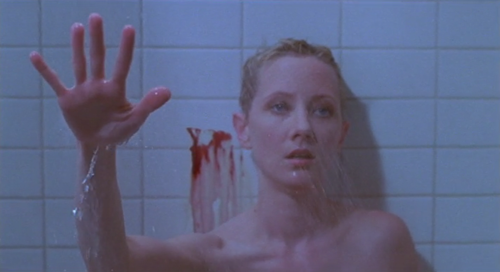
What Doesn’t Work:
Chastising P98 for being “pointless” feels somewhat pointless itself. I can accept Van Sant’s unnecessary act of mimicry. So, ironically in a way, I wound up having a much bigger problem with his changes. “Why do a shot-for-shot remake of Psycho?” Well, I think a better question is, “Why do a 96% shot-for-shot remake of Psycho?” Why change anything when your whole goal is to change nothing? When you do something nearly identically to something else, the conspicuousness of any alterations lends these alterations creative significance — they seem like commentary. Aside from natural differences that come from improved camera cranes and dollies and other filmmaking technology, P98 is indeed eerily identical to Psycho. So the changes pop out, and nitpicky questions that you would normally never ask a filmmaker remaking a film suddenly nag at your mind — why isn’t the Bates Motel’s sign neon? What’s with the big goofy letters on top of the motel? Why didn’t they use the iconic Bates house on the Universal lot, or at least recreate it? A two-word dialogue trim like the aforementioned Dr. Richmond line is one thing. Even shots of Viggo’s ass and putting Marion and Sam in a cuddling position during the film’s opening scene can be chalked up to, “hey, it’s 1998.” Then there is Norman Bates audibly masturbating while watching Marion Crane through the peephole in the motel office…
Why the fucking hell is that in the movie?
Sure, jerking off seems like the whole point of a creepy peephole, and you could easily argue that Hitchcock wasn’t able to show us the reality of that situation because it was 1960, so Van Sant is merely modernizing the scene — more “hey, it’s 1998.” But that’s the exact sort of logic one invests in a real remake. Not a shot-for-shot remake. Vince Vaughn’s unpleasant fap fap fap is such an emotional affront that it entirely recolors the character of Norman Bates afterwards. Hitchcock’s Norman came off as an arrested development man-child after this scene. He spied on Marion, but only very briefly and then moved on. Was he embarrassed by himself? We didn’t know. Van Sant’s Norman spanks his desires to completion. Now we know he’s a full on pervert. That is a major change to the character. There is no misleading innocence to Van Sant’s Norman; a problem that is compounded to infinity by…
Vince fucking Vaughn
I like Vaughn. I never got why Hollywood briefly thought he was a dramatic actor after Swingers, but I loved him in that film, in Made, and the early phase of his mid-00’s comedy comeback. But Christ on a bike is Vaughn awful in P98. It is hard to even blame him, because he is just so wildly miscast. If P98 is supposed to be Psycho, than presumably the casting choices are being made with WWHD goggles on. Who would Hitch have cast in 1998? Anthony Perkins was cast because he seemed like the last person you would be worried about as a young woman staying by yourself in a lonesome motel. He was tall, but in such a way that you barely noticed. He was skinny and blandly handsome with a friendly and inviting smile. It was his innocuousness and innocence that made him so creepy when the time came. Vince Vaughn is 6’5 and he looks every inch of it. He towers menacingly over every person he shares a scene with, despite his attempts to slouch un-intimidatingly, and his heavy lidded eyes, pursed lips, and puffy face frankly make him the total embodiment of a man that any woman would be completely unnerved by in Marion Crane’s situation. Watching Anne Heche act as though Vince Vaughn is harmless is completely unbelievable and totally undercuts what Hitchcock had been doing with the pre-shower scenes in Psycho. Janet Leigh was buff and taught; she seemed like she could have chewed up and spit out Anthony Perkins. Vaughn looks, sounds, and seems like a demented murderer, and he is bigger than the vast majority of actors/stuntmen who played Jason Voorhees. This effectively ruins a lot of the film’s power. Plus, it is just embarrassing watching Vaughn struggle so far outside his gregarious wheelhouse. Every scene he is in fails because of his presence.
Like Hitchcock’s Norman Bates, P98 also feels caught in arrested development. The film takes place in 1998, yet it doesn’t feel like it does. Yet it also doesn’t feel like it takes place in 1960. Like Gotham City in Batman: The Animated Series, Van Sant’s world feels like an alternate reality where various decades coexist. Like some netherworld. Part of this is Christopher Doyle’s cinematography. Since presumably shooting in black and white was one place Universal Pictures put their foot down, he did the next best thing and gives the film the color palette and lighting tone of an early 60’s color film. The film looks great, but since it already isn’t in black and white, I think the effect is somewhat misguided. The wardrobe department is in a similar bind — Anne Heche looks out of the 60’s, as do many of the other characters. Then Julianne Moore struts in, chains jangling, like someone out of a Lilith Fair band or a Portland vinyl shop. P98 doesn’t feel real. Another part of this is the film’s tone, which is inconsistent and often leans towards what comes off as meta satire (on the fact that we’re watching a shot-for-shot remake). Rita Wilson, taking over for Hitchcock’s daughter as Marion’s clueless coworker, delivers her dialogue in an almost mocking fashion. Macy, as Arbogast, gives a delightful performance, yet he too at times seems to be acknowledging that he’s a performer in a crazy remake — particularly in scenes with Viggo, who, being Viggo, is of course taking the role of Sam Loomis very seriously (he probably managed a hardware store for a year before shooting the film). While this tone can be fun in places, it undercuts a lot of Van Sant’s intentions, adding to that pervasive feeling everyone has while watching P98 — pointlessness.
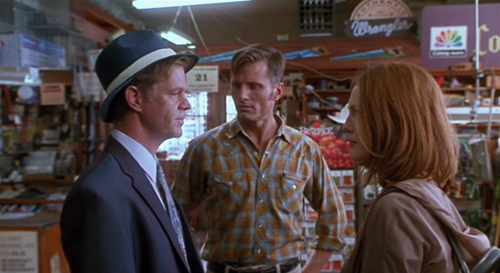
Body Count: 2
Best Kill: Marion’s shower scene. Though Hitchcock‘s strange staging of Arbogast’s death is bitchin’ too, with the insane shot of him improbably stumbling backwards down the stairs after “Mrs. Bates” slashes his face with a knife.
Best Norman Line That Really Should Have Tipped Someone Off: Said to Marion. “We all go a little mad sometimes.”
Best Mrs. Bates Line: I won’t have you bringing some young girl in for supper! By candlelight, I suppose, in the cheap, erotic fashion of young men with cheap, erotic minds!
Stupidest Line: After Lila asks him if Norman killed her sister.
Dr. Richmond: Yes… and no. Now fixed.
Does the Twist Ending Hold Water: Yes. The seclusion of the motel makes it entirely plausible that Norman could have had his mother’s corpse without anyone knowing. And based on what Richmond deduces at the end, Norman has only killed two other patrons in the past, both of whom were missing persons who were never connected to the Bates Motel.
Should There Be a Sequel: Yes. Don’t pussy out now Van Sant. I want a shot-for-shot remake of the whole franchise (especially Fahey’s crotch-based lamp show), up to and including Psycho 98. How meta would that be?
Franchise Assessment: Any franchise spawned from a cinema classic (especially spawned decades after said classic was made) is going to feel creatively cheap. Accepting that, Psycho‘s franchise is pretty stellar, as far as goofy slasher franchises go. The four proper films in the series do get worse with each following installment, but the drop in quality of the first two sequels is much smaller than their reputations seem to imply (especially Psycho III‘s reputation). And the franchise does demonstrate one thing: Norman Bates is an interesting anti-hero. Hitchcock did not set Norman up well for a franchise (hardly his problem), and the franchise in general suffers from a case of seat-of-the-pants thinking, undoing itself repeatedly with retconning. Remaking Psycho was/is a harebrained idea, but remaking the film with an eye towards a franchise isn’t so bad. Norman Bates is one of Hollywood’s most famous madmen, after all. If we’re thinking down the road, with the idea that the greater story of the franchise is Norman Bates trying desperately to stop being Norman Bates, I would be curious to see how an appropriate filmmaker would rethink the first film to properly facilitate this ongoing journey — without the need for corny and convoluted revaluations about Norman’s past. A proper remake needs to move beyond Hitchcock. Keep the young Anthony Perkins vibe for Norman (as opposed to Robert Bloch’s middle-age, fat alcoholic Norman), but drop the Marion Crane fake out. Drop Herrmann’s iconic violins, and drop the Hitchcock shower scene homages. Filmmakers shouldn’t forget how extremely close to Bloch’s novel Psycho was. Norman is already there, fully formed. Remaking Hitchcock is always going to seem stupid. Doing another adaptation of Bloch’s novel doesn’t have to be.
As I said in the Bates Motel piece, I think – done right – a Norman Bates TV show is possible, simply because it has such an important central location. I look forward to updating this column when the new Psycho TV series premieres.
Franchise ranked from best to worst:
Psycho
Psycho II
Psycho III
Psycho IV: The Beginning | Psycho (1998)
Bates Motel
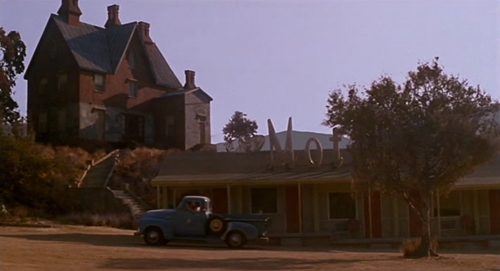
Up Next: ???
DISCUSS THE FRANCHISE ON THE BOARDS
previous franchises battled
Critters
Death Wish
Hellraiser
Home Alone
Leprechaun
The Muppets
Phantasm
Planet of the Apes
Police Academy
Rambo
Tremors